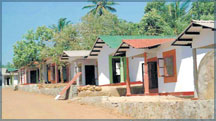|
DAILY NEWS ONLINE |
|
|
|
OTHER EDITIONS |
|
|
|
|
|
|
|
|
|
OTHER LINKS |
|
|
|
|
|
|
  |
Disasters and developmentToday when we think of disasters, it is the tsunami that comes to our mind immediately. But a huge disaster such as the one we experienced last December is rare and unlikely to occur with any kind of regular frequency. There are many other, localised disasters that are experienced everyday by people of this country and the damage wrought upon by those disasters are also quite significant.
However it did take a tsunami to shake up the establishment. Long before the tsunami the country had drawn up a plan for National Disaster Management and a Bill that would give the teeth to implement it. But these documents languished in the twilight zone between various approvals from Cabinet and Parliament and were never implemented in full. Then, in the aftermath of the tsunami a Parliamentary Select Committee was appointed to study the country's disaster scenario and came up with recommendations for better disaster preparedness as a country. Last week the committee's report was out. The report upholds many of the provisions that were made in the earlier disaster management plan and Act, and recommends that the institutions spelt out in the earlier plan be established in full and given more power and legal 'teeth' that is needed to implement the provisions of the plan. Among its many recommendations, the Committee looks at the intrinsic link between development activities and disasters. The need to build in counter-measures for disasters in all development plans is emphasised. The Committee sees that ad hoc development, housing, infrastructure, irrigations, dams and power generation, that does not take into consideration the disaster-proneness of its located area will be a tremendous liability and cost to the country in later years. Although any project has to have mandatory clearance and approvals (for larger projects they need to go through the process of Environmental Impact Assessment) this aspect of disasters is not looked at when issuing permits or approvals. There are two problems here. One is that the authority (local or national) does not have information on the disaster situation (proneness) of the given area to make correct decisions. But even when they do have this kind of information they are reluctant to use it or are persuaded by developers to ignore disaster warnings. A good example, is the detailed landslide and flood hazard maps prepared by the National Building Research Organisation for several landslide-prone districts. Although the local governments were active in mapping out process, they later locked these maps in their cupboards and ignored them totally when issuing permits for buildings, roads and other development. In other areas there are existing regulations, which if implemented properly would lead to a large reduction in damage to property and people when a natural disaster strikes. There could be no better example than that of the coastal zone. The Coast Conservation Department's regulations about development along the coastal zone is very clear, but were flouted by many and the Department was not proactive enough in implementing these regulations to their full. After the tsunami no one will argue that the strict implementation of these regulations is very necessary. While development must happen, people have to be saved -as far as possible-from the terrible impacts of natural disasters. The knowledge and the power to do that does not always rest with the community or even the developers. Many parties have to come together to make accurate scientific assessments of disaster prone areas, revise land-use maps, encourage mitigatory measures, include such concerns in to project planning and land use permits. |
|
|
|
 by Tharuka Dissanaike
by Tharuka Dissanaike 
